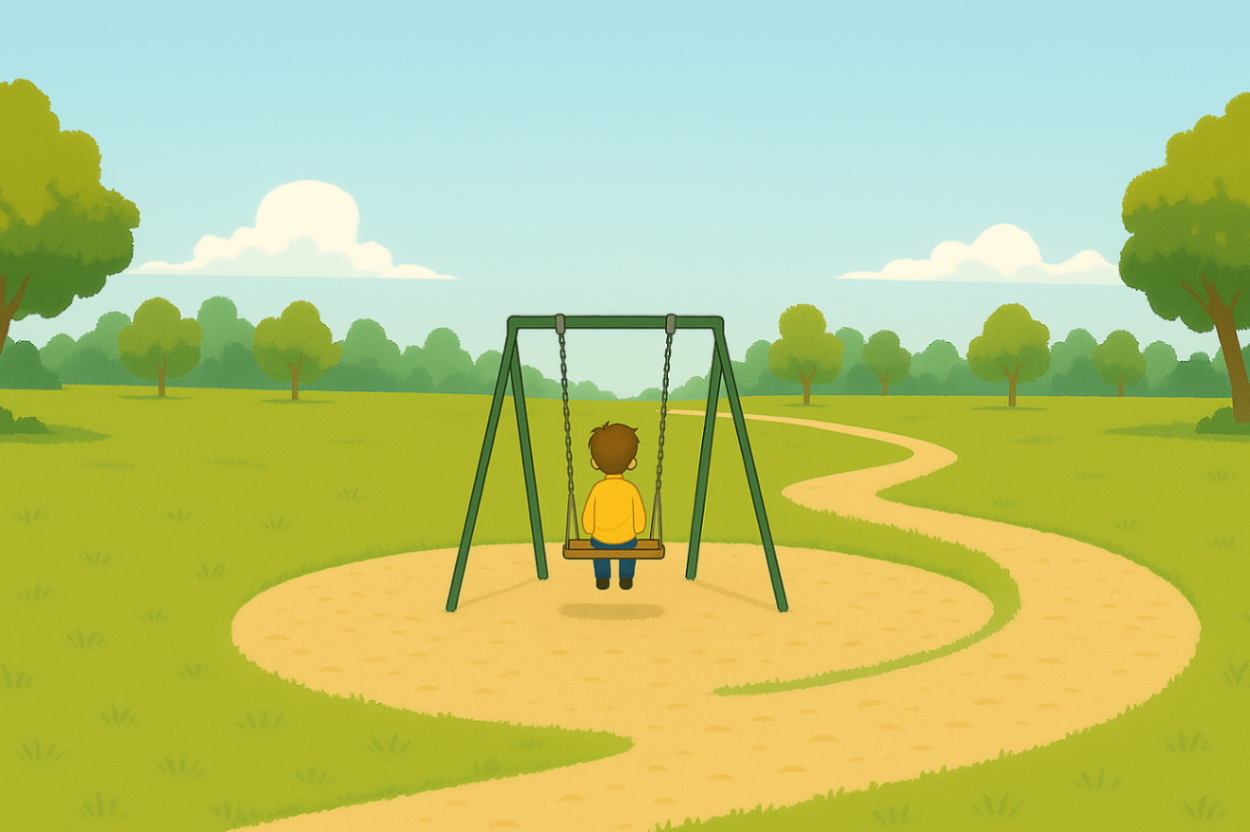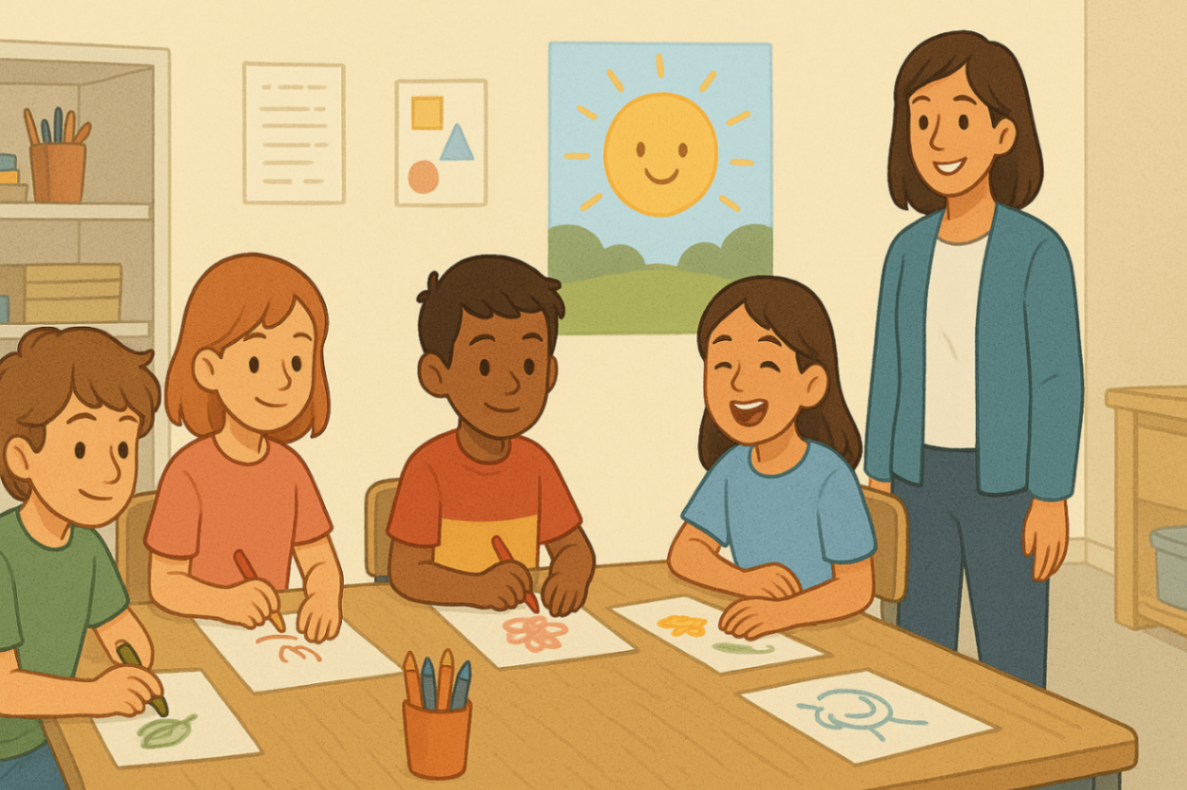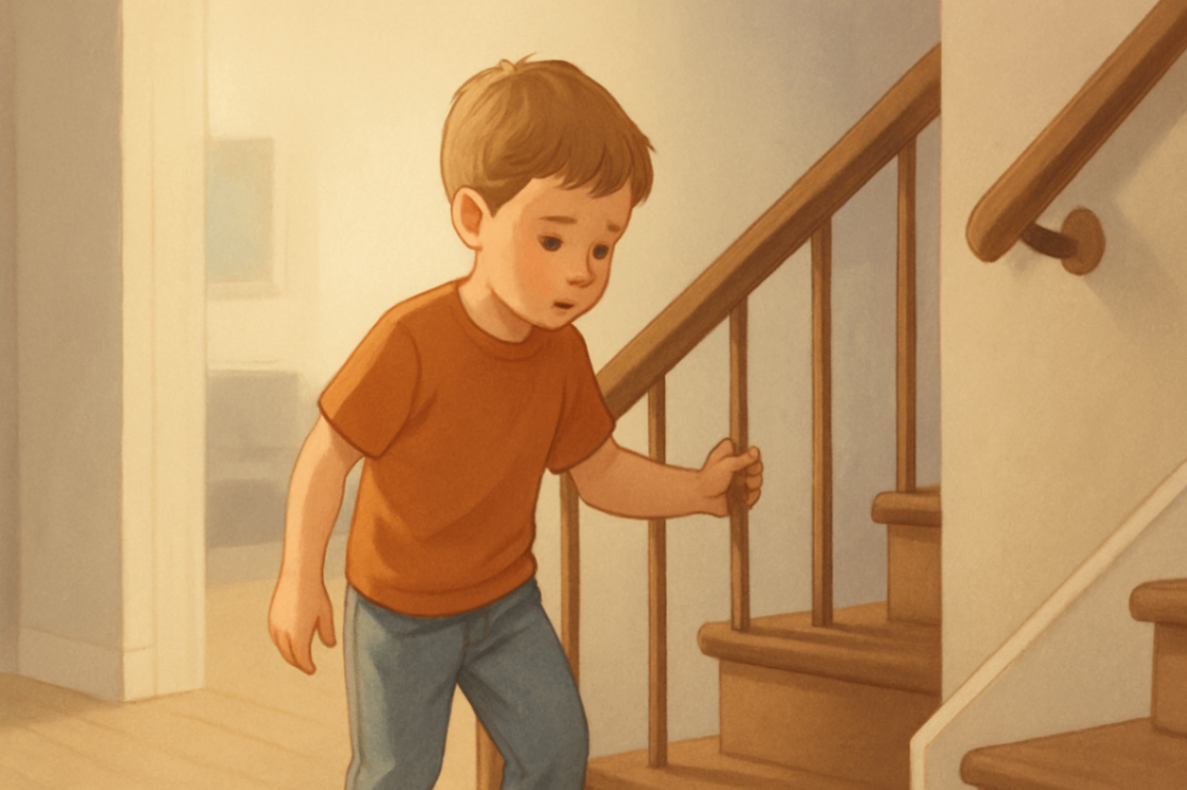
signs your child may benefit from positive behaviour support
23 June, 2025

Key Highlights
-
Recognising early signs of behavioural challenges in young children is essential for their mental health and family life.
-
Social skills and emotional regulation are key areas positively impacted by positive behaviour support strategies.
-
Understanding and addressing behavioural patterns can foster a supportive environment for young children.
-
Home dynamics, including family relationships, profoundly influence a child’s behaviour and emotional development.
-
Seeking professional help equips families with effective techniques for improving behaviour problems.
-
Early and strategic intervention leads to long-term benefits and healthier development for children.
Introduction
Children often express their emotions through behaviour—especially when they’re still learning how to communicate with words. While occasional outbursts or defiance can be a normal part of growing up, consistent challenges with emotional regulation, social interaction, or challenging behaviours related to following routines may signal a deeper need for support.
Recognising the early signs that your child may benefit from behaviour support is key to getting the right help at the right time. Positive Behaviour Support (PBS) is an evidence-based approach that identifies the causes behind behaviours and offers practical strategies to improve your child’s wellbeing. It also empowers families with tools that build confidence, reduce stress, and strengthen everyday routines.
When addressed early, even subtle behavioural concerns can lead to meaningful progress—helping your child thrive at home, in school, and in the community. If you want a clear, parent-friendly explanation of Positive Behaviour Support, read Understanding Specialised Positive Behaviour Support for Kids.
Understanding Positive Behaviour Support (PBS)
 Positive Behaviour Support (PBS) is a helpful idea that aims to help children who have problems with how they act. It focuses on knowing how a child feels and why they show certain behaviours. With PBS, there are ways that can really help children improve their social skills and emotional regulation. Mental health workers, parents, and teachers are all involved in this approach. They give support and try to keep things consistent no matter where the child is. All the support and understanding are based on each child’s own needs. Knowing the signs of when a child may need PBS is the first step. This can really help to get good results and make family life better.
Positive Behaviour Support (PBS) is a helpful idea that aims to help children who have problems with how they act. It focuses on knowing how a child feels and why they show certain behaviours. With PBS, there are ways that can really help children improve their social skills and emotional regulation. Mental health workers, parents, and teachers are all involved in this approach. They give support and try to keep things consistent no matter where the child is. All the support and understanding are based on each child’s own needs. Knowing the signs of when a child may need PBS is the first step. This can really help to get good results and make family life better.
Common Early Signs of Behavioural Challenges
Behaviour problems can start in small ways. You may see them in younger children as trouble with emotional regulation, refusing to listen, or getting upset often. If these are not managed, they can hurt family life and may turn into bigger problems later.
If you pay attention to these signs early, you can help your child before things get worse. Watching for patterns like outbursts or trouble with rules gives families a chance to find effective ways to support their child’s mental health and growth, possibly with the guidance of a psychiatrist.
Frequent Temper Tantrums or Emotional Outbursts
Tantrums can push a parent’s patience, but they are a normal part of growing up for young children. Still, if there are many tantrums, it could mean that a child finds it hard to control emotions. These outbursts can show up more in stressful situations. Things like sudden changes or unclear rules can make it worse. Children often have a tantrum when they get too upset and do not have the right way to say what they need.
To handle these tough moments, it helps to stay calm. You can show your child how to act by keeping cool, even if things get hard. For example, instead of getting upset, take deep breaths where your child can see you doing it. You can also make things simpler or use pictures to show what comes next. This can stop some situations that cause a tantrum.
Giving positive feedback is important too. Be sure to notice and say well done when your child is calm, even if they only try. This can help them learn good ways to deal with feelings and build their confidence a little at a time. By doing this and helping your child in their struggles, you make a safe place where they can get better at emotional regulation.
Persistent Defiance or Noncompliance
Defiance in young children is sometimes normal as they learn to be independent. But at times, it may be a sign of a bigger problem, like oppositional defiant disorder, conduct disorder, or a behaviour disorder. If your child often does not follow rules, talks back a lot, or gets angry with you, there might be deeper issues to look at in their family life.
For young children who act this way, you can try setting a firm routine and giving clear, simple instructions. Instead of arguing, say things like, “It’s time to sit down.” If your child listens, you can reward good behaviour with a little more playtime. This shows them what you want and helps them do it again.
If you find that defiance causes problems for your whole family and it keeps happening, the first step is to look for professional help. Behavioural therapy is one of the treatment options that can show what is causing the trouble and teach your family better ways to get along. By getting help and having a plan, you can help your child feel better and build a stronger, calmer home for everyone.
Social and Communication Difficulties
 Social struggles like trouble making friends or sharing how they feel may show there are problems under the surface for young children. If a child has poor communication or weak social skills, it can hurt their self-esteem and stop them from connecting with friends and family.
Social struggles like trouble making friends or sharing how they feel may show there are problems under the surface for young children. If a child has poor communication or weak social skills, it can hurt their self-esteem and stop them from connecting with friends and family.
If your child struggles with social skills, they may look quiet or get upset. Helping your child say what they need or feel helps them talk better. You can use simple talks or fun activities to help your child understand their feelings. This can make things better at home and with friends. It also helps your child and your family build stronger bonds.
Struggles with Making or Keeping Friends
Having friends is a big part of how young children grow and learn. Still, some kids can have a hard time making or keeping friends. Things like not understanding feelings, trouble talking to others, or other social barriers can make it tough for them. These problems can sometimes make a child feel left out or alone.
To help your child with social skills:
-
Get them involved in group things that need everyone to work together, like sports or art projects.
-
Show them how to act in social situations by playing games where they learn to take turns or share.
-
Give them praise when they try to make friends, as this helps build their confidence.
For example, if your child gives a toy to someone without you asking, you can say, “You did a great job sharing; that made your friend happy.” Talking about what they did right can help them feel good and ready for the next time, and it teaches them how to handle these moments. With help and support, young children can learn how nice it can be to make and keep friends, which is really good for their feelings.
Difficulty Expressing Needs and Emotions
Some children have trouble showing what they need. They might start yelling or stop talking. A lot of the time, this happens because they do not have enough words or skills for talking about how they feel. Young children might not know how to say what is wrong. That can make them feel upset.
To help your child talk more, you can use easy sentences. Try saying, “Can you tell me what’s wrong?” You can also let them pick between things, like saying, “Do you want the blue toy or the red toy?” Show them that you understand by saying things like, “I understand this is hard for you.” This helps with emotional regulation and makes their feelings clear.
Ask them to draw pictures if talking is tough. You could say, “Draw how you feel.” This lets them show their feelings without words and can start a talk about what is going on. When you support your child in these ways for a long time, they get better at saying what they need. This makes it easier for you and your child to understand each other and have peace at home.
Triggers and Patterns in Your Child’s Behaviour
 Behaviour problems often come from clear triggers or things that keep happening again. If you see these signs, you can better understand what is happening with your child. You will also know when these behaviour problems might show up.
Behaviour problems often come from clear triggers or things that keep happening again. If you see these signs, you can better understand what is happening with your child. You will also know when these behaviour problems might show up.
For example, tough behaviours can pop up after your child gets excited or when there is a sudden change in what they are doing. When you keep an eye on these times, you can help your family stop trouble before it starts. This way, you and your child can have fewer meltdowns and less acting out. Seeing the triggers makes it easy for parents to try different strategies that fit their child. It gives the child a better chance to work on emotional regulation and makes time together much better.
Reactions to Changes and Transitions
Changes can be hard for children. When there are transitions, like moving from one activity to another, it can lead to stressful situations. Kids may feel unsure and like they do not have control. This can make them act out or want to be alone.
To help make these changes easier, give a countdown. For example, say, “In 10 minutes, we’ll stop playing and start dinner.” Make what is happening next clear by showing plans with charts or timers. These ways can lower surprises and help children feel more steady.
If changes are still tough, set up routines that stay the same. Doing bedtime the same way every night, like taking a bath, reading a story, and turning off the lights, helps kids know what will happen next. Giving comfort and making changes small will help build your child’s confidence and make transitions less hard with time.
Sensitivity to Sensory Stimuli
Sensitivity to things like light, noise, or touch can make children feel very upset. This can affect the way they act and how they feel in their mind. For example, bright lights may upset them and lead to tantrums. Some kids may not like how some clothes feel and might stay away from those.
Watch for what seems to bother your child, and make changes to help. If your child gets upset in loud places, try using headphones or help them find a quieter spot. At home, you can make a special “calm space” with soft light and toys that help them relax. This space can give comfort when things get to be too much.
If these sensitive feelings get in the way of your daily life, you may want to talk to a mental health professional or your child’s doctor. Their help and know-how can guide you and your child to find good ways to handle different things around them. Taking care of these needs can help your child have better and happier days. It also supports their mental health by making their world feel safe and welcoming.
Emotional Regulation Issues
 Many younger children can have trouble with emotional regulation. This can show up in different ways, like strong reactions to small problems. Often, this shows that there may be bigger mental health issues going on.
Many younger children can have trouble with emotional regulation. This can show up in different ways, like strong reactions to small problems. Often, this shows that there may be bigger mental health issues going on.
It is good to give positive reinforcement when your child handles their own emotions well. Doing this helps them grow and become more strong. They will also learn to be flexible and handle stressful situations better. When you focus on emotional regulation early on, you help your child deal with complex feelings as they grow.
Intense Reactions to Minor Frustrations
When there are small problems, like a lost toy or words someone does not expect, it can make younger children feel big emotions. This shows that they may have trouble with emotional regulation. Many of them do not have a good way to deal with being let down. At this time, they need someone to help them learn how to handle these feelings in a better way.
When one of these situations happens, let your child know you notice how they feel. You can say, “I can see that losing your block made you upset.” After that, show them how to do a breathing exercise to help take away some of the stress. When you act calmly and have patience, you teach a good way to handle stressful situations.
Give your child praise for any step in the right direction. You can say, “You did a great job calming down before you talked about what is wrong.” When you give this kind of good feedback, they learn better ways to react when they are upset. Step by step, this helps make things easier when problems come up in the future.
Difficulty Calming Down after Upset
Some children have a hard time getting over emotional distress. Stressful situations can last a long time in their minds, and this can make them feel lost instead of calm. When this happens, it shows they need help with emotional regulation.
You can help your child by teaching them ways to feel calm. Try deep breathing together, or turn down bright lights if the room feels too loud. Things like coloring in a quiet space can help them slow down and relax. You can say, “Let’s take a break and breathe together.” This shows them what to do.
After things have calmed down, praise your child for using calming skills. This helps your child link these steps to good feelings about emotional regulation. If you keep practicing the right ways, your child will feel more sure of themselves and get better at handling emotional upsets on their own.
Family Dynamics and Home Life
Family life has a big effect on a child’s behaviour and the way they talk and show how they feel. When there are problems at home, it can make behavioural problems worse. However, support from a child’s teacher and good habits at home can help guide a child in the right way.
When the people in the family talk to each other in a positive way, behaviour often gets better on its own. Solving problems at home and keeping to a steady routine helps create a warm place to live. This kind of life at home gives younger children a good base. It helps them grow and do well, both with their feelings and with other people. Consistency in daily life is important for a child’s behaviour and for stopping behavioual problems before they start.
Sibling Conflicts and Rivalry
Sibling rivalry can have a big impact on family life. It often shows up as kids trying to outdo each other, feel jealous, or act out with aggression. All these things can create stressful situations and affect a child’s feelings. This can lead to fights at home.
Try to get your kids to do things together, like play games as a team. Be sure to praise them when you see good moments, such as when you say, “I loved how you both worked together to solve that puzzle.” It also helps to set clear rules and have consequences for bad behaviour. This makes it harder for arguments to break out.
If your kids keep having problems, family therapy can help talk through the issues. When everyone works on open talk and treats each other fairly, stronger sibling bonds can grow over time.
Strained Parent-Child Relationships
A strained parent-child relationship can hurt the mental health of both you and your child. It can also make everyday family life hard. Often, this happens when behaviour problems keep getting worse. The best way to fix this is by being consistent and keeping open communication between you and your child. These steps help rebuild trust when things get tough.
Spend one-on-one time with your child every day. This helps build trust and makes your bond stronger. You can cook together, or go for a walk. These simple activities let you connect without any judgment. Remember to use kind words like, “I enjoy spending these moments with you.” This helps your child feel valued.
If stress keeps coming back, it’s a good idea to get professional help. Parent training programs or counseling can make it easier for you to handle tough situations. When you keep trying, these parent-child relationships can get better. This helps your child’s mental health and makes family life more pleasant.
If these behaviours sound familiar, it may help to understand what Positive Behaviour Support actually is.
When to Consider Professional Help
There are times when some challenges in behaviour need help from a mental health professional. This can be when behaviours get worse, do not stop, or make family life hard and damage relationships.
A comprehensive evaluation is the first step to find out what treatment options may help your child. The options may include therapy or extra support for your child’s needs. Getting professional help is the first step to better understand what your child needs. This support can help your child grow to be stronger, emotionally and in their overall life.
Signs That Indicate the Need for Assessment
When behavioural problems persist in a toddler or interfere deeply with daily life, an assessment may be necessary. Common reasons include heightened aggression, extreme defiance, noticeable mood swings, or difficulty maintaining relationships. Below is a detailed table outlining possible warning signs:
|
Behavioural Sign |
What It Signals |
|---|---|
|
Constant fighting |
Potential oppositional defiant disorder or unresolved family tension |
|
Frequent nightmares |
Stressed mental health or trauma-related issues |
|
Skipping school |
Indications of anxiety or environmental stressors affecting performance |
|
Damaging property |
Conduct disorder or anger regulation issues |
A referral for professional help ensures these signs are addressed with appropriate care and support strategies.
How Early Intervention Can Make a Difference
Early action in behavioural therapy is the first step that can help stop behaviuoral problems from having long-lasting effects. When you act fast, you help young children develop better social skills. It also helps them learn to handle their feelings in a better way.
Therapists help you find treatment options that fit each person. These can include using clear routines and different techniques to control emotions. Families often see big changes when they use things like reward systems or give children positive attention. If you talk to a mental health professional, you and your child can work together on a plan to handle these problems.
When parents act early, they give their children tools that help them do well in life. This helps their mental health and gives them hope for brighter days ahead.
When to Consider PBS Over General Therapy
Positive behaviour support (PBS) looks at certain things in a child’s behaviour that other general therapy might miss. PBS does not wait for problems to happen. It uses steps to stop issues before they start. This is what makes PBS different, especially when a child needs special help with their behaviour.
Behavioural therapy often helps with bigger emotional problems. PBS, on the other hand, works by finding out what sets off a child’s behaviour and making clear rewards that fit the child. If a family is dealing with things at home or feelings that affect the child’s behaviour, PBS can give more specific help.
It is a good idea to talk to a health care provider before choosing what is right for your child. PBS can meet each child’s needs and gives ways to handle their behaviour in day-to-day life.
Conclusion
Spotting the early signs of behaviour problems in your child is key to their growth and well-being. Positive Behaviour Support (PBS) is a good way to deal with these problems. It helps you understand your child’s unique needs and what sets them off. Watch out for things like your child having strong emotional outbursts, trouble with others, or issues with emotional regulation. This way, you can start to build a caring and safe place for them.
If you step in early, you can make a big difference. You help your child do well, both with friends and at home. If you think your child could use PBS, you should reach out for professional help right away.
Wondering if Positive Behaviour Support is right for your child? Book a consultation today to speak with a behaviour support specialist and get the guidance your family needs to move forward with confidence.
Frequently Asked Questions
What behaviours suggest my child may need PBS?
Behaviours that show your child may need Positive Behaviour Support (PBS) can include a lot of tantrums, saying “no” often, pulling away from other people, finding it hard to handle changes, and still having tough times with friends. If you see these behaviours, it can help you know if your child needs more support.
At what age can children begin behaviour support?
Children as young as two years old can start to get help with the way they act. When you step in early, this can really help to deal with problems. Caregivers are able to use good ways to help their kids grow emotional and social skills. It is important to give support to fit what each child needs. This helps the child handle tough things and learn better ways to act.
Can PBS be used alongside other therapies?
Yes, positive behaviour support works well with behavioural therapy and other treatment options. Many families talk to health care providers to get a comprehensive evaluation. They also add PBS to other ways of giving good care.
Is PBS only for children with a diagnosis?
No, PBS is not just for kids who have been diagnosed with ADHD or conduct disorder. In the United States, many suggest using PBS to help with emotional regulation and tough behaviours, even if there is no official condition.
Will PBS help with my child’s school behaviour?
PBS can really help your child behave better in school. It does this by encouraging good interactions with others and looking at deeper problems that might be there. PBS helps to make the school a more helpful place, where kids learn social skills and how to manage themselves. This means they often do better in school and get along well with other students and teachers.
.svg)

















